
Automation Is Only Valuable If It’s Reliable
Healthcare organizations depend on automation for:
- Prior authorizations
- Eligibility checks
- Referrals
- Document ingestion
- Billing preparation
- Scheduling support
- Compliance validation
If automation goes down, everything stops:
- Appointments get delayed
- Charts remain incomplete
- Claims pile up
- Authorizations expire
- Patients wait longer
- Staff are forced to scramble
Because of this, healthcare automation platforms must meet enterprise-grade reliability standards, not consumer-level performance.
Here’s how top automation vendors ensure uptime, stability, and safety for essential workflows.
1. Redundant, Distributed System Architecture
Reliable vendors operate across multiple data centers with:
- Redundant servers
- Distributed computing nodes
- Geo-redundant cloud infrastructure
- Automated failover systems
Why it matters:
If one server or region goes down, workloads automatically shift to another — without disruption.
2. Continuous Real-Time System Monitoring
Leading platforms monitor:
- Workflow throughput
- API response times
- Payer portal availability
- Queue backlogs
- Error spikes
- System load
- User activity patterns
Monitoring is proactive, not reactive.
Why it matters:
Problems are identified and resolved before customers feel them.
3. Automated Retry, Recovery & Failover Logic
Payer portals often experience:
- Downtime
- Slow responses
- Login failures
- Rate limiting
- Maintenance windows
Automation platforms must automatically:
- Pause workflows
- Retry tasks
- Switch to alternative channels
- Queue work safely
- Recover gracefully
Why it matters:
Payer instability doesn’t become your instability.
4. High-Throughput, Auto-Scaling Infrastructure
Healthcare workflow volume changes rapidly:
- Morning surges
- End-of-month spikes
- Seasonal trends
- New-site onboarding
- Clinical expansion
Vendors must auto-scale:
- Compute resources
- Document processing pipelines
- Data extraction nodes
- Queue processing speed
Why it matters:
Your automation performance stays stable even during peak volume.
5. Strict SLAs and Performance Guarantees
Top-tier vendors offer:
- 99.9%+ uptime commitments
- Response time SLAs
- Resolution time guarantees
- Priority support tiers
Why it matters:
Automation becomes a dependable part of operations, not a risk factor.
6. Secure System Isolation for PHI & Workflow Safety
Automated workflows involve sensitive actions like:
- Submitting PAs
- Accessing EHR data
- Processing faxes
- Handling billing information
Vendors ensure safety using:
- Role-based access control (RBAC)
- Multi-factor authentication
- Encrypted data transit & storage
- Network isolation
- Compliance checks
Why it matters:
Reliability includes security — a breach is a form of system failure.
7. Detailed Audit Logs for Every Workflow
Every automation action must be logged:
- Who accessed data
- What decisions were made
- What documents were uploaded
- When submissions occurred
- Which payer rules were applied
- What errors occurred and why
Why it matters:
Full traceability reduces compliance risk and speeds troubleshooting.
8. Blue-Green Deployment for Updates
Great vendors avoid downtime by deploying updates using:
- Blue-green staging
- Canary releases
- Shadow testing
- Automated rollback mechanisms
Why it matters:
The system continues working even during upgrades or maintenance.
9. Rigorous Testing Before New Releases
Quality engineering ensures:
- Regression testing
- Payer-portal compatibility tests
- Load testing
- Security testing
- Performance validation
- Integration checks
Why it matters:
Updates don’t break existing workflows.
10. Dedicated Support & Escalation Teams
High-reliability vendors offer:
- 24/7 on-call engineering
- Priority support channels
- Rapid escalation protocols
- Dedicated customer success managers
- Direct communication paths for large MSOs
Why it matters:
Help is available immediately when it matters most.
The Bottom Line: Healthcare Automation Must Operate Like Critical Infrastructure
Operational automation touches:
✔ Patient access
✔ Revenue cycle
✔ Clinical readiness
✔ Compliance
✔ Staff workload
✔ Scheduling
✔ Documentation quality
Reliability isn’t optional — it’s the foundation.
Automation vendors must deliver:
✔ High uptime
✔ Real-time monitoring
✔ Strong failover systems
✔ Secure, compliant infrastructure
✔ Resilient queue management
✔ Continuous performance optimization
✔ Dedicated enterprise support
Why Honey Health Sets the Standard for Reliability
Honey Health ensures unmatched stability through:
✔ Multi-region, redundant cloud architecture
✔ Automated failover and recovery
✔ Full real-time monitoring
✔ High-throughput, scalable infrastructure
✔ 99.9% uptime SLAs
✔ Built-in payer portal resilience
✔ Encrypted, isolated PHI handling
✔ Detailed audit logging
✔ Blue-green zero-downtime deployments
✔ 24/7 engineering & support coverage
Honey Health doesn’t just automate workflows —
we ensure those workflows run flawlessly, every hour of every day.

